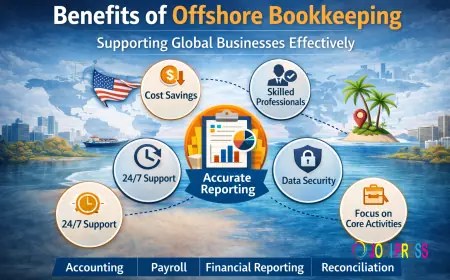Why Top U.S. Accounting Firms Choose Offshore Outsourcing Solutions
offshore services for accounting firms. By adopting offshoring accounting services, leading U.S. accounting firms are not only cutting costs but also gaining access to skilled professionals, modern technology, and flexible business models that support long-term growth.

In the ever-changing financial landscape, U.S. accounting firms face constant pressure to reduce costs, stay compliant, and deliver faster, more accurate services to clients. But with rising labor expenses, talent shortages, and the demand for round-the-clock availability, many firms are asking the same question: Is there a smarter way to manage accounting operations without sacrificing quality? The answer lies in offshore services for accounting firms. By adopting offshoring accounting services, leading U.S. accounting firms are not only cutting costs but also gaining access to skilled professionals, modern technology, and flexible business models that support long-term growth.
The Shift Toward Offshore Outsourcing in Accounting
A decade ago, outsourcing was considered a cost-saving measure primarily used by large corporations. Today, even mid-sized and boutique U.S. accounting firms are turning to offshore outsourcing solutions. Why? Because the challenges they face—tight deadlines, complex tax regulations, and a shortage of skilled accountants—require scalable and affordable solutions.
Offshoring allows firms to:
-
Handle larger volumes of work without hiring additional full-time staff.
-
Access highly trained accountants who understand U.S. tax laws and GAAP standards.
-
Streamline operations with the help of cloud-based technology and automation.
This shift is no longer about “outsourcing tasks” but about creating a strategic partnership that strengthens client service and profitability.
Why Offshore Services for Accounting Firms Are Growing in Demand
Let’s break down why more U.S. accounting firms are embracing offshoring accounting services:
1. Cost Efficiency Without Compromise
Hiring accountants in the U.S. comes with high salaries, benefits, and overhead expenses. Offshore outsourcing provides the same (or higher) level of expertise at a fraction of the cost. This allows firms to stay competitive while maintaining healthy profit margins.
2. Access to Global Talent
The accounting industry faces a talent shortage in the U.S., especially during tax season. Offshore teams bridge this gap by offering skilled professionals who are experienced in U.S. tax compliance, auditing, payroll, and bookkeeping.
3. Scalability During Peak Periods
Every accounting firm knows the crunch of tax season. Offshore outsourcing enables firms to scale quickly by adding offshore professionals during peak demand, then scaling down when workloads normalize.
4. Around-the-Clock Operations
With teams working in different time zones, offshore services provide near 24/7 operations. This means U.S. firms can send tasks at the end of the day and receive completed work by the next morning.
5. Focus on Core Client Advisory Services
By outsourcing repetitive tasks like bookkeeping, payroll processing, and reconciliations, accounting firms can dedicate more time to advisory services, strategic planning, and client relationship building.
Services U.S. Accounting Firms Commonly Offshore
So, what exactly are firms outsourcing? Offshore solutions cover a wide range of accounting functions, including:
-
Bookkeeping & Data Entry – Recording daily financial transactions.
-
Accounts Payable & Receivable – Managing invoices, payments, and collections.
-
Payroll Processing – Ensuring accurate and timely employee payments.
-
Tax Preparation & Filing Support – Assisting with federal, state, and local tax compliance.
-
Audit Support Services – Gathering, analyzing, and verifying financial data.
-
Financial Reporting – Preparing balance sheets, P&L statements, and customized reports.
By leveraging offshore expertise, U.S. firms can handle complex workloads without overstretching their in-house teams.
Addressing Concerns About Offshore Outsourcing
Despite the clear benefits, some firms hesitate to adopt offshore outsourcing because of concerns around quality, security, and control. Let’s tackle these head-on:
-
Data Security: Reputable offshore providers use secure, encrypted platforms and comply with international data security standards like GDPR and SOC 2.
-
Quality of Work: Offshore teams are often trained in U.S. accounting standards and bring extensive industry experience.
-
Loss of Control: Cloud-based collaboration tools, regular reporting, and service-level agreements ensure firms maintain full oversight of outsourced tasks.
When done right, offshore outsourcing does not reduce control—it actually increases transparency and efficiency.
Real-World Advantages for U.S. Accounting Firms
The impact of offshore services for accounting firms goes beyond cost savings. Firms that adopt offshoring accounting services often report:
-
Improved client satisfaction due to faster turnaround times.
-
Higher profitability from reduced labor costs and increased efficiency.
-
Better staff retention as in-house teams focus on meaningful, high-value tasks instead of repetitive work.
-
Faster growth potential, since firms can take on more clients without worrying about capacity.
This creates a competitive advantage in a crowded market where clients demand accuracy, speed, and affordability.
The Future of Offshoring Accounting Services
As technology continues to evolve, the scope of offshore outsourcing will only expand. Cloud platforms, AI-driven accounting software, and secure digital workflows are making cross-border collaboration easier than ever.
Looking ahead, U.S. accounting firms that embrace offshore solutions will be better positioned to:
-
Offer value-added advisory services.
-
Compete with larger firms on both price and quality.
-
Adapt to changing regulations and industry standards.
Offshore outsourcing is no longer just a trend—it’s becoming a cornerstone of modern accounting strategy.
Final Thoughts
The reality is clear: top U.S. accounting firms are choosing offshore outsourcing solutions not just to cut costs but to build stronger, more scalable business models. By leveraging offshore services for accounting firms and embracing offshoring accounting services, firms can handle more work, improve profitability, and deliver unmatched client value. For accounting leaders, the question is no longer “Should we outsource?” but “How quickly can we integrate offshore solutions into our practice?” Those who adapt now will be the firms that lead tomorrow.
What's Your Reaction?
 Like
0
Like
0
 Dislike
0
Dislike
0
 Love
0
Love
0
 Funny
0
Funny
0
 Angry
0
Angry
0
 Sad
0
Sad
0
 Wow
0
Wow
0















































